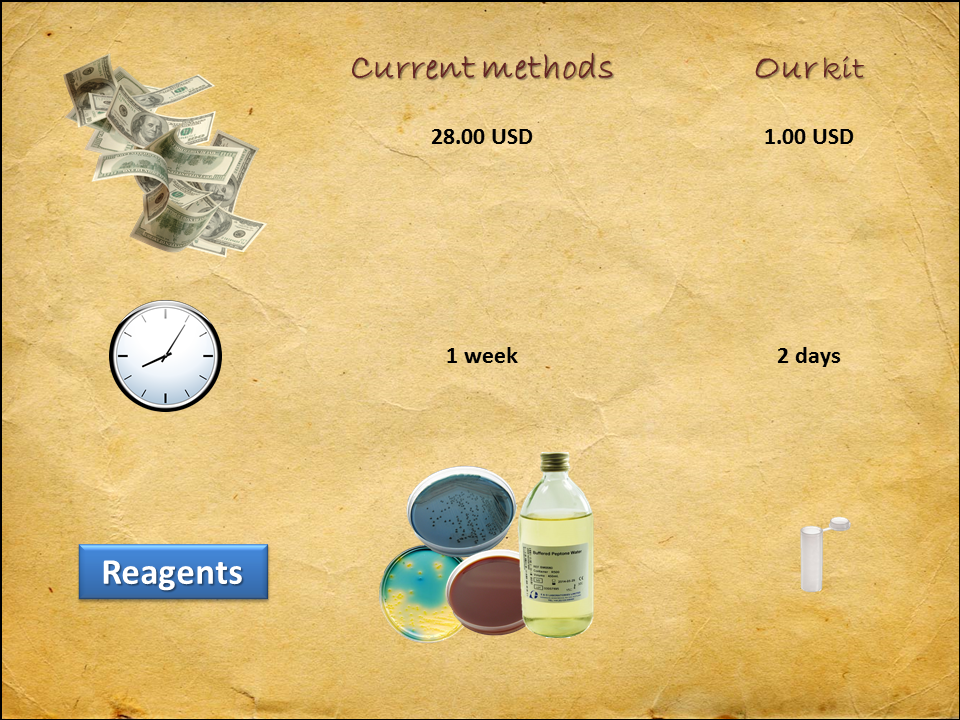Team:Colombia/WAIEEI
From 2014.igem.org
Industrial, Economic
and Ethical Issues
Economy
Does our kit worth to use instead the current methods? Is it cheaper or only atractive but less feasible? Aimed to respond these questions we analyze the current situation about prices of most used methods to detect Vibrio sp. in industry and labs.
There are a lot of selective and differential kind of agars for Vibrio sp.. You always have to begin with TCBS agar, in which you culture a pre-enriched sample in peptone water. In this point you alreadsy got to spend 48 h of your time plus USD 28.00 (for 40 TCBS dishes) and USD 138.0 (for 500 g of bufferd peptone water).
If you get suspect colonies, you got to identify the specie, reason by which you got to spend your money (and several days) performing biochemical tests or using other agars (as Vibrio Agar, V. vulnificus Agar, V. parahemolyticus Agar). Or if you prefer molecular technologies, you can spend less time (but more money) using a PCR. Other methods suchs as immunological reactions or toxins purifications are only used in research because of their high prices. With these agars you will have spent at least USD 400 for other 40 Petri dishes each.
In conclussion, to detect Vibrio sp. in a food or water sample is necessary to be able to spend one week and USD 570.0. The price for each reaction is USD 28.50 (keeping on mind that even if you don't use all the available agars, you have to acquire them if you want to be able to find what the specie of your Vibrio is).
You can check the Standar procedures to identify V. cholerae in Colombia.
So, how much will be our kit? We don't know!... But we can do an approximation: Delvotest is an easy-use kit to detect antibiotics in milk, it usses thermophilic bacilli as indicators. Each reaction of delvotest costs USD 1.50 and you can buy them for 25 or 100 units. Now, think that our kit will be made of an easier-culturable bacteria (E. coli!) and needs no indicator as Delvotest does (the color will be produced by E. coli itself, due to mRFP or AmilCP genes). Taking the above into account, we can hypotezyse that our kit could be cheaper than Delvotest, it means around USD 1.00 (28 times cheaper than current methodologies). And remember that our mathemetical models indicates that we can obtain results in 48 h using our kit.
But things are not always so easy... we are using pqrr4 promoter (which is very conserved among Vibrio sp.) and a phosphorilation cascade from Vibrio cholerae., but this bacterium is not the only one that usses CAI-1 autoinducer, so what will happen if our kit is sensible to Vibrio sp. rather than specific for Vibrio cholerae.?? See the next section! ;)
Industry
In our interview to María Consuelo we learnt that Food Insdustries in Colombia look for V. cholerae in their products as prevention, and if one of them find it, sending a report to National Heatlh Institute is mandatory. In that case they have to be sure that the found bacterium is V. cholerae, so the report cannot just say Vibrio sp.
We also learnt that in other Latin American Countries other Vibrio species, different to V. cholerae are a serios problem in public health, for example Vibrio vulnificus and Vibrio parahemolyticus in Mexico.
In addition, other Vibrio species are a serious problem, not as human pathogens, but as fish pathogens in fish breeding.
The information cited above allows us to hypotezyse that our easy-use kit would very useful for Latin American industry no matter its specificity if it can detect bacteria in low concentrations.
If our kit would be able to detect Vibrio spp. (including Vibrio cholerae) , it would be used as a primary screening, and the following tests to identify the specie are simple. In this scenario, a negative result allows user (lab, food industry or fish breeder) to not worry about their samples for the posible Vibrio spp. presence.
On the other hand, if our kit is Vibrio spp. specifi, it could not be used by other purposes than to detect this bacterium in foods and water, but it would spare time and mony in further tests and allows a faster report to send it to Health authorities.
Ethics
We learnt, because of our interview with Dr. Suárez, that every single scientific project carries ethical issues which have to be taken into account by the researchres ad by all involved people. Off course, our project is not an exception, so we had to analyze these issues.
Fortunately we can say that our project does not involve serious ethical issues, this because of the following reasons:
• We did not work directly with V. cholerae or with any other pathogen. All the organisms involved in our project were bacteria (no mammal cells).
• Our final product (an easy-use kit) is meant to be used in laboratories, industries and universities; that means, it will be used by trained people. Our product will be easy-disposable and wont got to have directly contact to foods id order to get a result.
For the above reasons, our project does not have ethical issues more than the coomon necessary issues in all sythetic biology's project. These issues are well known and well discussed in scientific (icluding philosophical) literature. Most of those are related with genetic manipulations.
On References we show you a brief, but excellent, compendium of revised cietific literature about this topic. These papers also discuss the issues mentioned above.
References
1. TCBS Medium
2. Vibrio Agar
3. YGC Agar
4. Peptone Water
5. Delvotest
6. Standar procedures to identify V. cholerae in Colombia
7. Ethical issues in Synthetic Biology
8. Synthetic Biology: Social and Ethical Challenges
9. The ethics of Synthetic Biology and Emerging Technologies
10. A priority paper for the societal and ethical aspects of synthetic biology
 "
"






